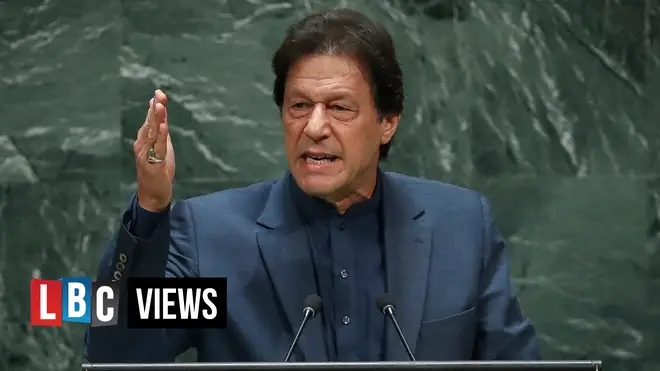
Clive Bull 1am - 4am
1 February 2024, 09:16

The lion has been caged.
In Islamabad, Pakistan, former prime minister Imran Khan has been sentenced to 14 years behind bars for corruption. It comes just a day after a court found him guilty of leaking state secrets. The verdict: 10 years in prison.
Khan is already locked up. For months now, he’s been serving out another corruption sentence at a prison south of Islamabad.
At 71, it looks like the fallen politician will rot in a cell for the rest of his days.
It’s the latest twist in the saga of Imran Khan, the “Lion of Lahore”.
Dashing, with an impressive head of hair, fiery eyes and broad shoulders, Khan has long been making headlines.
He shot to fame in the 1980s as an international cricketer. In 1992, he made sporting history when he led Pakistan to victory in the Cricket World Cup, its one and so far only victory.
An Oxford graduate, Khan has longstanding links to the UK. In his heyday, he was a regular on London’s glitzy night scene. He developed a reputation for partying hard and romancing supermodels.
But, in 1995, aged 42, Khan settled down and married Jemima Goldsmith, the daughter of British tycoon Jimmy Goldsmith. They divorced nine years later.
Soon, Khan hung his cricket bat and reinvented himself as a populist politician in his native Pakistan.
Pakistani politics have long been dominated by two families, the Sharifs and the Bhuttos. But the real power behind the throne, many believe, are the generals of the Pakistan Armed Forces.
Khan vowed to change it all.
He railed against corrupt elites and pledged to usher in a Naya Pakistan—a new Pakistan with justice and prosperity for all. “No country,” he believed, “can prosper where there is a small island of rich people, and a sea of poor.”
To remedy that, Khan would build an “Islamic welfare state”.
The reference to Islam was significant. As Khan grew older, he became more pious. In 2018, he married Bushra Bibi, a Sufi scholar and faith healer whom he called his “spiritual leader”.
And in his speeches, Khan frequently invoked religion in a bid to court conservative voters. “My inspiration is the prophet Muhammad,” he once said.
Finally, in 2018, Khan was elected prime minister.
His victory sparked controversy. Rumours circulated that the election had been rigged in his favour by the generals. (Khan and the generals denied the allegations.)
Following Khan’s election, many Pakistanis, especially the youth, harboured high hopes. But his rocky tenure didn’t live up to the hype.
Khan proved unwilling to build a new Pakistan. Under his watch, corruption continued. Political opponents were jailed. And inflation went through the roof. By early 2022, it was the highest in South Asia.
Meanwhile, on the international scene, he caused controversy by supporting the Taliban in Afghanistan.
In April 2022, Khan was ousted by a vote of no-confidence in the Pakistani Parliament.
Khan alleged that the generals were pulling the strings. As he saw it, they were acting on the orders of the United States. “The establishment that engineered our removal from government,” he wrote in The Economist earlier this month, was “under pressure from America, which was becoming agitated with my push for an independent foreign policy and my refusal to provide bases for its armed forces.”
The Pakistani government and the US State Department deny Khan’s allegations.
Even out of office, Khan remained a popular figure in Pakistani politics. He crisscrossed the country and held rallies which attracted huge crowds.
But tensions ran high. In November 2022, Khan survived an assassination attempt by a lone gunman.
Last summer, he was barred from holding office after he was found guilty of corruption. This means that he’s unable to run in next week’s general election.
In recent months, Khan has been dogged by lawsuits, which he dismisses as “politically motivated”.
Today’s verdict of 14 years in prison cements Khan’s spectacular fall from grace. But it might not quite spell the end of his political career.
He still retains a groundswell of support. When he was first arrested last year, it triggered violent protests across the country.
And so the saga of Imran Khan continues. The lion might roar again, for better or worse.